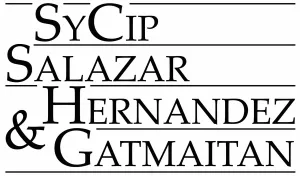The SyCipLaw T.I.P.S. for August covers the following tax issues:
- May the Bureau of Internal Revenue issue assessments against a taxpayer based on third-party information?
- May a taxpayer avail of the provisional remedies of a Suspension Order and a Writ of Preliminary Injunction/Temporary Restraining Order at the same time in the same case?
- May the CTA rule on the validity of a BIR issuance which was previously declared void by a Regional Trial Court?
- For taxable years prior to the Corporate Recovery and Tax Incentives for Enterprises Act, is a company registered with the Philippine Economic Zone Authority (PEZA) exempt from improperly accumulated earnings tax even if it is under income tax holiday and not under the 5% special tax regime which is imposed in lieu of all other taxes?
- Is the renunciation of rights, interest and participation in the settlement of estate of the decedent subject to donor's tax and documentary stamp taxes?
- Are social media influencers required to register with the BIR?
- How can a social media influencer avoid the risks of double taxation on income received from non-resident foreign companies residing in a country with which the Philippines has a tax treaty?
1. May the Bureau of Internal Revenue issue assessments against a taxpayer based on third-party information?
Yes, provided that such third-party information is verified or confirmed with the relevant customers or suppliers. In Commissioner of Internal Revenue v. Mercury Group of Companies, Inc. (CTA EB No. 2215 (CTA Case No. 9531), June 30, 2021), the Court of Tax Appeals En Banc (CTA En Banc) ruled that "[w] ithout conducting such confirmation or verification, the data gathered from the computerized/third party matching are left unsubstantiated, and the resulting assessment is void for lack of factual and legal basis."
In this case, the Bureau of Internal Revenue (BIR) issued deficiency tax assessments (corresponding to alleged undeclared service income, undeclared purchases and unaccounted source of cash) based only on discrepancies arising from a comparison between taxpayer's Summary List of Sales (SLS) and Summary List of Purchases (SLP) vis-a-vis third-party SLS and SLP. The CTA En Banc noted that the BIR failed to verify the amounts reflected in the third-party SLS and SLP with the relevant customers and suppliers, and this "casts doubt as to the reliability and correctness of the findings of deficiency taxes assessed by [it]."
The CTA En Banc ruled that "[i]n order to stand the test of judicial scrutiny, the assessment must be based on actual facts. The presumption of the correctness of an assessment, being a mere presumption, cannot be made to rest on another presumption."
2. May a taxpayer avail of the provisional remedies of a Suspension Order and a Writ of Preliminary Injunction/Temporary Restraining Order at the same time in the same case?
Yes. In Commissioner of Internal Revenue v. Court of Tax Appeals and Pilipinas Shell Petroleum Corporation (G.R. No. 210501, March 15, 2021), the Supreme Court clarified that "the subject matters of these two remedies are separate and distinct; hence, the issuance of one does not necessarily result into or preclude the other."
If the taxpayer appeals a tax assessment, decision, ruling, or inaction mandating the payment of taxes, it may file a Motion for a Suspension Order to suspend the collection of the specific amount of taxes stated in such assessment or demand for the collection of taxes. On the other hand, if, in appealing the tax assessment, decision, ruling or inaction, the taxpayer questions the constitutionality or validity of a tax statute or issuance, it may also seek (in the same petition) a Temporary Restraining Order (TRO) or a Writ of Preliminary Injunction (WPI) to restrain the immediate implementation of the statute or issuance.
SyCipLaw TIP 1: Under the BIR's Reconciliation of Listings for Enforcement (RELIEF) System, the BIR may match taxpayer-provided information with externally sourced data in order to detect any under-declaration of revenues or over-declaration of costs and expenses. While this should encourage taxpayers to faithfully report their revenues and expenses in their returns, the BIR should still verify the amounts obtained from the RELIEF System and should not issue assessments based solely on the amounts generated under the RELIEF System.
A motion for reconsideration of the decision of the CTA En Banc is currently pending.
CTA decisions, while persuasive, do not form part of the law of the land, unlike decisions of the Supreme Court.
If the taxpayer appeals a tax assessment, decision, ruling, or inaction mandating the payment of taxes, it may file a Motion for a Suspension Order to suspend the collection of the specific amount of taxes stated in such assessment or demand for the collection of taxes.
On the other hand, if, in appealing the tax assessment, decision, ruling or inaction, the taxpayer questions the constitutionality or validity of a tax statute or issuance, it may also seek (in the same petition) a Temporary Restraining Order (TRO) or a Writ of Preliminary Injunction (WPI) to restrain the immediate implementation of the statute or issuance.
SyCipLaw TIP 2: If the elements for a Suspension Order and a TRO/ WPI are present, it remains prudent for a taxpayer to apply for both provisional remedies in the same petition. It must be noted though that the Supreme Court observed that a TRO/WPI appears to be a broader relief which renders unnecessary further Suspension Orders covering future assessments stemming from the assailed tax statute or issuance.
To view the full article please click here.
The content of this article is intended to provide a general guide to the subject matter. Specialist advice should be sought about your specific circumstances.

